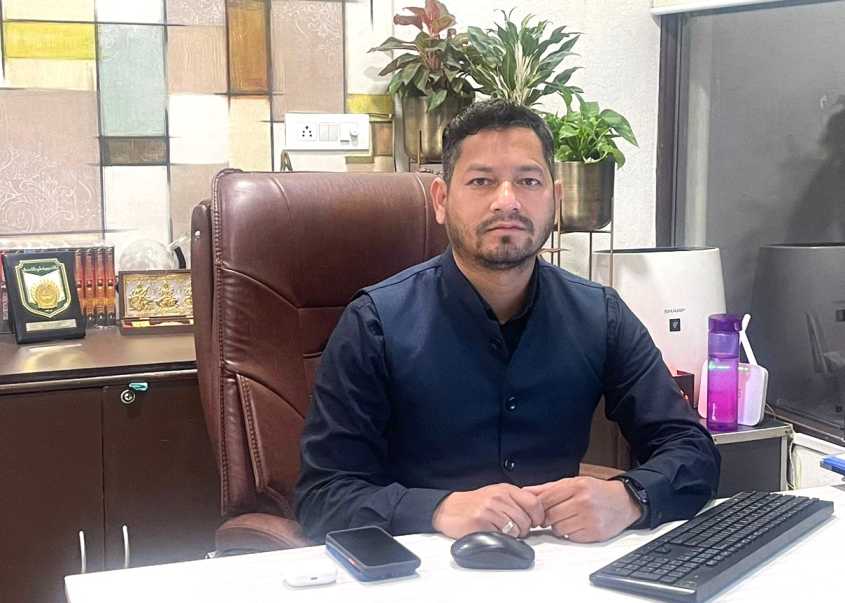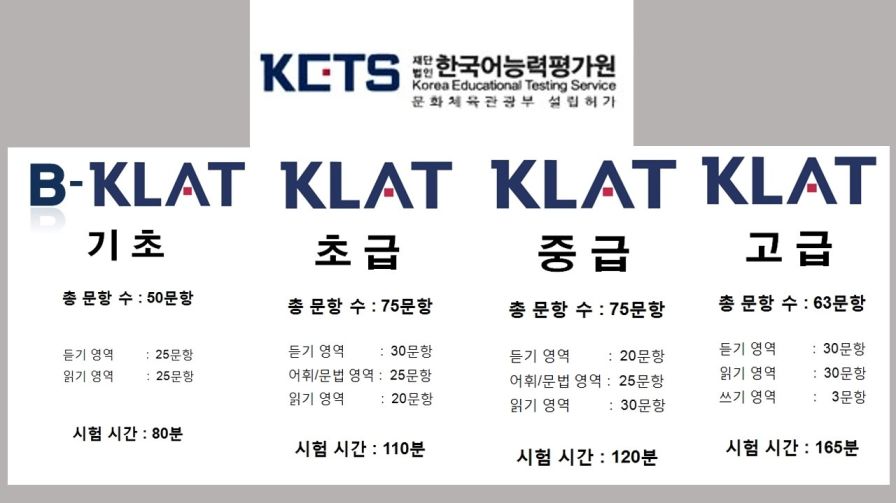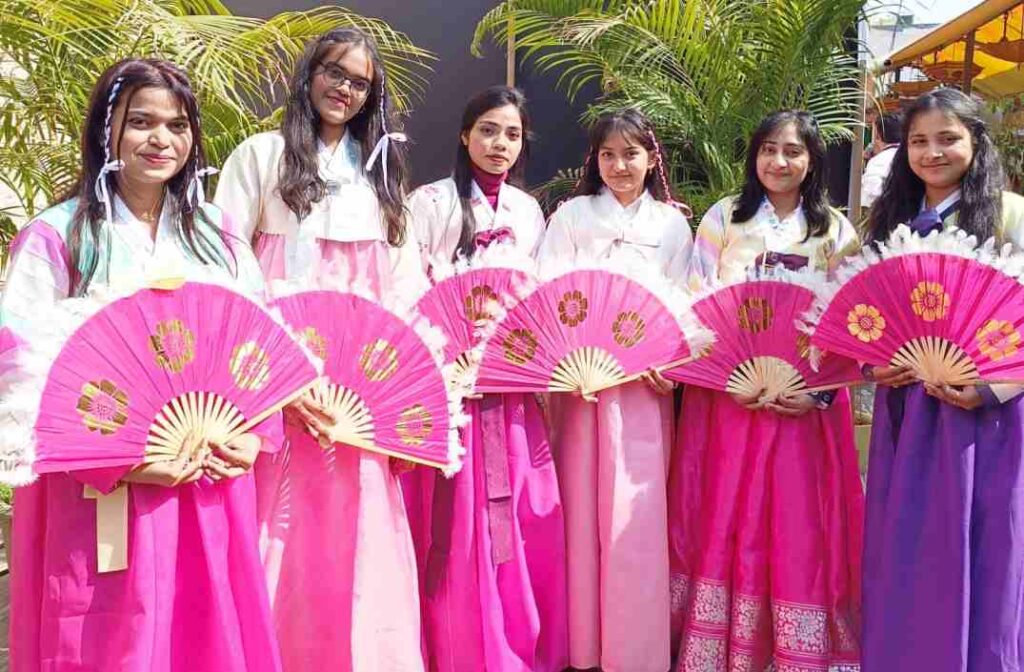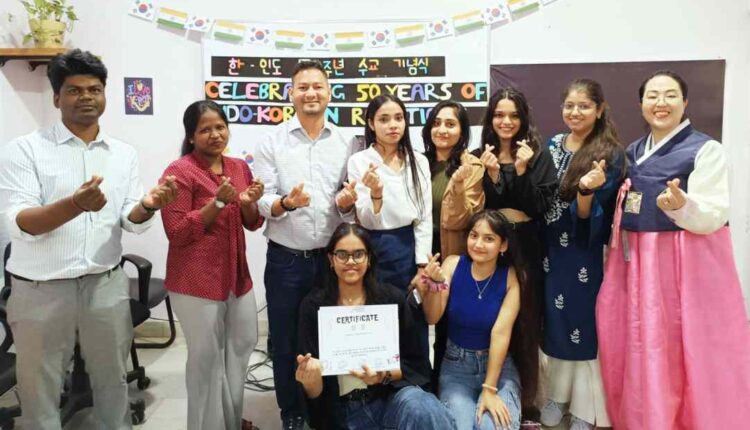Korean Language Ability Test – KLAT (한국어능력평가시험) reaches India
ACN EXCLUSIVE: The credit of bringing Korean language proficiency test KLAT to India goes to New Delhi-based Langma School of Languages that has successfully rolled out its first batch of 50 students this year.
NEW DELHI/SEOUL: The Korean Language Ability Test – KLAT (한국어능력평가시험), one of the two official Korean language tests (the other one being TOPIK), has entered India offering Indian students more options to take language proficiency tests, and become certified Korean language experts.
Operated by Korea Educational Testing Service (KETS) and recognized by the Ministry of Culture, Sports and Tourism of South Korean government, the KLAT is already prevalent in 10 countries other than South Korea – Japan (10 cities), China (8 cities), Hong Kong, Germany, Canada, Mongolia, Vietnam, Malaysia, Uzbekistan and Nepal where KLAT are conducted twice a year.

The credit of bringing KLAT to India goes to New Delhi-based Langma School of Languages that has successfully rolled out it first batch of 50 students who appeared in this Korean language proficiency test this year. Langma School of Language serves as an official examination center for KLAT.
Langma is one of the best foreign language institutes in the world, and has been a pioneer in imparting knowledge of more than 50 International and Regional languages to individual students, corporate houses and government institutions since its inception in 2007, and has benefited more than 100,000 trainees so far. Some of the languages being taught here include Japanese, Korean, Arabic, Balkan, Chinese, French, German, Hindi, Italian, Russian, Persian, Polish, Spanish, English, Sanskrit, and others.
Sanjeev Rawat, Founder and Managing Director, Langma School of Languages told Asian Community News (ACN) Network that KLAT enjoyed a high level of reputation across the world. “Operated by Korea Educational Testing Service (KETS), KLAT is authorised by the Ministry of Culture, Sports and Tourism of South Korea. For many years, KLAT tests are conducted in multiple cities in 10 countries other than South Korea. However, we have brought KLAT to India and have already rolled out a batch of 50 students who qualified this test after training at our institution Lengma,” Rawat added. He said that Lengma was preparing to enroll students for the second batch as well.

KLAT is an international test of Korean language developed to assess the Korean proficiency of non-native Korean speakers by minutely considering their distinct characteristics.
Unlike Test for Proficiency in Korean (TOPIK), which has 1 to 6 levels, KLAT has B-KLAT Introductory (grade 1 to 2) that aims to assess the minimal proficiency of a Korean learner for 150 to 200 hours, KLAT Novice (grade 1 to 2) for up to 400 hours, KLAT Intermediate (grade 3 to 4) for up to 800 hours, and KLAT Advanced (grade 5 to 6) for more than 800 hours.
According to Mr. Rawat the format of KLAT is based on Common European Framework of Reference (CEFR) for Languages, assessing the authentic proficiency of Korean language. It aims to assess the proficiency of practical-Korean language reflecting the reality of a language by utilizing authentic-Korean materials in the questions of KLAT. It also aims at developing and utilizing an assessing tool to include various aspects of linguistic proficiency such as level of general communication, level of task-performance in a society, level of detailed-linguistic activity, and so on.
Rawat said that KLAT is widely recognized by Korean colleges, universities, companies, as well as government institutions.

The KLAT qualified candidates could submit their KLAT score for admission to Korean university and Korean companies, etc. Global-Korean companies may consider the KLAT score of the employees to screen or promote non-Korean employees.
Korean or overseas university could consider the KLAT score to screen non-Korean students or assess the Korean proficiency of students for the term-end exam. And also the Government or its affiliated organizations could consider the KLAT score to screen non-Korean trainees or foreigners for their positions.
Langma School of Languages is already accredited for being the authorised centre for conducting the International Exam Preparation programme designed to prepare learners for the HSK (Hanyu Shuiping Kaoshi) or (Chinese Proficiency Test). Langma offers an integrated learning experience, and its programmes are short and tailored to ensure International Dutch Examination Success.
Mr. Rawat said, “These tests are accepted in the People’s Republic of China for Employment, Immigration, and University enrolment. The course consists of the practice of all four modules (HSK) Listening, Reading, Writing, & Speaking. Langma School of Languages offers classroom and online training and is recognized as one of the best training centers globally. Our teachers would share tips, techniques, and an extensive list of vocabulary and grammar for Speaking and Writing. We diligently mark our students’ progress and help them in overcoming their weaknesses.”


